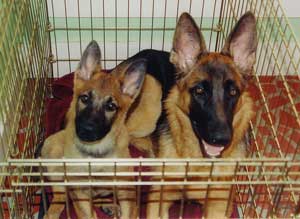Nearly every dog trainer in the United Stares recommends crate training. However a few problems are associated with crate training that are not commonly addressed. First of all, people tend to overuse the crate. Whenever they feel like they are too busy for the puppy, it ends up in the crate, and sometimes spends almost its entire puppyhood in the crate instead of with its owner. This leads to a puppy growing unmanageable, with bad manners, unsocial, fearful or aggressive, and often leads to a dog being given away to a shelter Ė all because the dog was given no chance to learn how to behave in a family environment.
A puppy is a lot like a child. If you put your child away into a separate room every time he or she misbehaves or is difficult to deal with, instead of working out the problem, you would not expect your child to grow up to be social, loving, and loyal. It is the same with a puppy. If a puppy
spends more time in a crate than with you, then it will bond with itís crate, and not with you. Also, it will never have a chance to learn to live with you and your family. It will never have a chance to learn that it is prohibited to put its feet on the countertop, or to jump on you, etc.

Another very common misconception is that crate training helps housetraining. The theory behind this is that if a puppy makes a puddle while in the crate, it would have to lie in it, or next to it, which is not pleasant, so the puppy then would hold longer and relieve itself outside. Well, there is a physiological limit to how long a puppy can hold it. With a young puppy it is not long at all. So even though your puppy hates it, and was holding for as long as it could, it will end up laying in itís puddle anyway, if not taken out of the crate in time. This does not really teach your puppy anything. Secondly, when puppy ends up living in a crate, it naturally doesnít want to soil it. So, the moment you take it out of itís crate, here comes an immediate puddle on your carpet. I have heard of many people struggling with this problem, which they basically have created themselves by constantly keeping their puppy in a crate.
And as if this was not enough, there are additional consequences of keeping a German Shepherd puppy in a crate: ears that never come up, weak, loose joints, atrophied muscles, antisocial behavior, soiling the crate as an adult, etc.
The bottom line is: you should have a large crate for your Gernam Shepherd puppy, such as a Vari Kennel 500 series, and use if for emergencies, travel, or when you absolutely must. It is a good idea to leave a puppy in a crate when everyone is gone and there is no one to keep an eye on it. This confinement should not last more than 4 hours though. Also, you can use a crate at night. We usually keep a crate for the puppy in our bedroom so that when it starts whining at night we can take it out to potty. In just a few weeks your puppy and you will be able to sleep through the night.
In order to housetrain, rather than keeping our German Shepherd puppy in a crate, we usually keep it in a kitchen/hallway area, where it runs free, interacts with family, and learns how to deal with us without risking the carpets (we use a baby gate to separate it from the carpeted area). We try to take puppy out to potty every 2 hours, and they usually cooperate. Right after the puppy did everything it was supposed to do outside, we bring it in, remove the baby gate, and let it run free (under supervision, of course) anywhere in the house. This way the puppy learns that not only the kitchen/hallway, but an entire house is his living area, and in the future will try to avoid making puddles anywhere in the house. Otherwise, one day you will decide that your puppy is old enough to be on the carpets, and the next thing you know Ė there is a puddle, because your puppy is not used to those areas and considers them ďoutsideĒ.
German Shepherd puppies need a lot of social interaction with the family and a lot of space to move around for proper physical and mental development. If properly trained, dogs usually like their crates and consider them their den. Use treats to train your puppy to go into the crate on command. You can expect your puppy to be fully housetrained by 7-8 months old. For more information on houstraining, please see our article
"Housetraining"
Copyright 2005. For information on making use of this article see
Terms and Conditions